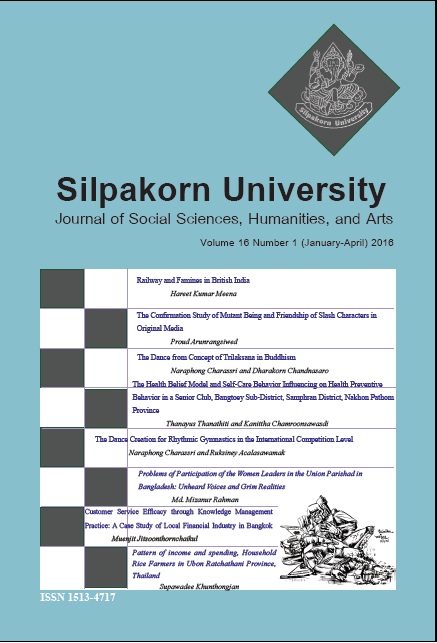The Health Belief Model and Self-Care Behavior Influencing on Health Preventive Behavior in a Senior Club, Bangtoey Sub-District, Samphran District, Nakhon Pathom Province
Main Article Content
Abstract
This research was to study levels of individual beliefs based on Health Belief Model, levels of self-care behavior, levels of health preventive behavior and to study influential relationship between levels of Health Belief Model and levels of self-care behavior, and levels of health preventive behavior. This study is a quantitative research. A study population comprises of 231 seniors (aged 60 years old or above) in a senior club of Bangtoey sub-district, Nakhon Pathom Province. The researcher employed a questionnaire, synthesized from relevant literature. Obtained data were then analyzed by SPSS, based on a sample size of 197 seniors from a simple random sampling technique.
The findings revealed that most seniors were married female, with 71 years old, having a monthly income of 1,239 baht, on average. Most of them finished primary school. More than half of the participants (i.e., 51.30%) was classified into a ‘unhealthy’ condition group—which could be subcategorized into a self-assisted and a non self-assisted groups. Most seniors demonstrated high levels on Health Belief Model. Most of them have a ‘rarely practice’ level of self-care behavior, of which an environmental hygiene subcategory ranked first at ‘often’ level, while doing exercise subcategory ranked last at ‘rarely practice’ level. Regarding health preventive behavior, most seniors showed that they were at ‘often’ level, of which diabetes preventive behavior subcategory ranked first. The influential relationship by stepwise regression analysis of Health Belief Model and self-care behavior, and health preventive behavior revealed that there were positive influential variables on health preventive behavior: (1) self-care behaviors on environmental hygiene, (2) food, (3) emotion, and (4) Health Belief Model on perceived susceptibility. These four variables accounted for 50.10% of predictive power on health preventive behavior among seniors.
Downloads
Article Details
All rights reserved. Apart from citations for the purposes of research, private study, or criticism and review,no part of this publication may be reproduced, stored or transmitted in any other form without prior written permission by the publisher.
References
Becker, M. H. (1974) The Health Belief Model and Preventive Health Behavior. Health Education Monographs 2(4): 354-385.
Becker, M. H. (1977) The Health Belief Model and Prediction of Dietary Compliance: A Field Experiment. Journal of Health and Social Behavior 18: 348-366.
Bureau of Policy and Strategy, Ministy of Public Health. (2007) The Health Protection Campaign “Healthy Thailand”: Health Strategic Plan of Thailand. Bangkok: The War Veterans Organization of Thailand.
Chanprasit, C. et al. (2005) Health Seeking Behaviors among the Elderly in Muang District Chiang Mai. Nursing Journal 32(2): 72-83.Thailand.
Chayovan, N. (2005) The Vulnerable Elderly Persons in Thailand. Journal of Demography 21(1): 1-24.
Department of Health, Ministry of Public Health. (2004) Elderly Health Care Guide. Bangkok: The War Veterans Organization of Thailand.
Fishbein, M. and Ajzen, I. (1975) Belief, Attitude, Intention, and Behavior: An Introduction to Theory and Research. Reading, MA: Addison-Wesley
Ministry of Public Health. (2007) Thailand Health Profile 2005-2007. Bangkok: The War Veterans Organization of Thailand.
National Statistical Office, Ministry of Information and Communication Technology. (2011) The 2011 Survey on Status of Elderly in Thailand. Bangkok: National Statistical Office.
Orem, D. (1985) Nursing concepts of practice, 3rd ed., NY: Mcgraw-Hill.
Pender, N. J. (1987) Health Promotion in nursing practice, 2nd ed., Connecticus: Appleton & Lange.
Roger, R. W. (1986) Protection Motivation Theory. Health Education Research Theory and Practice 1: 153-161.
Rogers, R. W. and Prentice-Dunn, S. (1997) Protection Motivation Theory.
In Handbook of Health Behavior Research: Vol. 1. Determinants of Health Behavior: Personal and Social, edited by D. Gochman, pp. 113-132. New York: NY Plenum.
Thanathiti, T, et al. (2006) Accessibility for Disable Persons and Member in Society. Bangkok: Ekphimthai Ltd.
Thatsaeng, B, et al. (2012) Effects of A Self-Management Supporting Program on Self-Manangement Behaviors and Blood Pressure. Nursing Journal 39(4): 124-137.
The Secretary of the Cabinet. (1997) Constitution of The Kingdom of Thailand B.E 2540 (1997). Bangkok: The Secretary of the Cabinet.
Traimongkolkul, P. and Chatraphorn, S. (2010) Research Design, 6rd ed., Bangkok: Kasetsart University Press.
Wothawee, O. (2005) Factors Promoting Health Behavior among the Elderly in District of Bang Phae, Ratchaburi Province. MA Thesis, Community Psychology, Graduate School Silpakorn University, Nakhon Pathom, Thailand.


